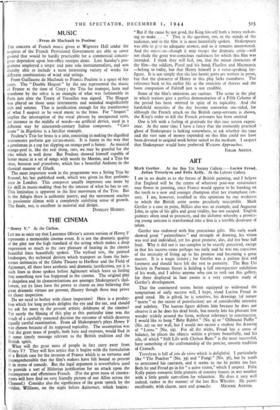THE CINEMA
" Henry V." At the Carton.
LET me at once say that Laurence Olivier's screen version of Henry V represents a memorable cinema event. It is not the dramatic quality of the play nor the high standard of the acting which makes a deep impression so much as the rare pleasure of hearing in the cinema beautiful lines beautifully spoken. The stylised sets, the painted landscapes, the technical devices which transport us from the bois- terous intimacies of the Globe Theatre to Harfleur and the Field of Agincourt, all these have aesthetic and dramatic justification, yet it is such lines as those spoken before Agincourt which leave us feeling that something new has happened in the cinema. The original play is shapeless and its characterisations are amongst Shakespeare's shal- lowest, yet its lines have the power to charm us into believing that great dramatic virtues are present, illusory though these may prove on closer inspection. Do we need to bother with closer inspection? Here is a produc- tion which for long periods delights the eye and the ear, and should we ask for more in the present artistic doldrums of the cinema? Yet surely the filming of this play at this particular time was the result of a carefully reasoned decision the outcome of which deserves equally careful examination. From all Shakespeare's plays Henry V was chosen because of its supposed topicality. The assumption was that the great mass of people, both here and overseas, would find in it some timely message relevant to the British tradition and the British spirit. What will the great mass of people in fact carry away from Henry V? They will first notice that it begins with the formulation of a British case for The invasion of France which is so tortuous and incomprehensible that the film's makers have felt bound to present it in terms of comedy. But the legal argument is nevertheless used to provide a sort of Hitlerian justification for -an attack upon the incompetent and effeminate French. (For the great mass of cinema- goers will here find no very friendly picture of our Allies across the Channel.) Consider also the significance of the great speech by the soldier, Williams, on the night before Agincourt, which begins:
" But if the cause be not good, the King himself hath a heavy reckon- ing to make . . . " This is the question, too, in the minds of the audience, and in the film it is most beautifully spoken. Shakespeare was able to give no adequate answer, and so it remains unanswered. And the omission—though it may escape the dramatic critic—will not elude the great war-conscious audiences for which this film was intended. I think they will feel, too, that the minor characters of the film—the soldiers, Pistol and his band, Fluellen and Macmorris —belong to today, but that Henry himself is a verse-speaking lay- figure. It is not simply that the less heroic parts are written in prose, but that the character of Henry in this play lacks roundness. The reference back to his earlier life as the associate of thieves and the boon companion of Falstaff just is not credible.
Some of the film's omissions are curious. The scene in the play in which traitors give a perfect demonstration of a Fifth Column of the period has been omitted in spite of its topicality. And the battlefield atrocities of the day become somewhat one-sided, for although the French attack on the British camp-servants is shown, the King's order to kill the French prisoners has been omitted
One is left with a feeling of gratitude for this rare screen experi- ence. At the same time I have a fancy that the eminently practical ghost of Shakespeare is lurking somewhere, to ask whether the time and the vast sum of money expended on this .film could not have been devoted to original work better suited to the medium. I suspect that Shakespeare would have preferred Western Approaches.
EDGAR ANSTEY.


























 Previous page
Previous page